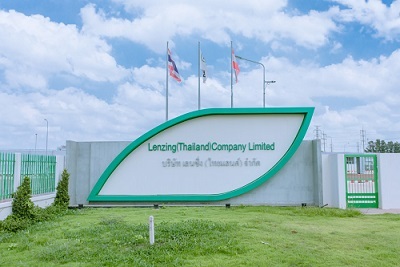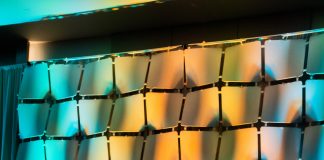The Lenzing Group, an international supplier of wood-based specialty fibers, announced completion of its lyocell expansion project in Thailand. The plant, the largest of its kind in the world with a nameplate capacity of 100,000 tons per year, started production on schedule and will help to meet increasing customer demand for TENCEL branded lyocell fibers.
For Lenzing, the project represents an important step towards strengthening its leadership in the specialty fiber market and into a carbon-free future. The construction of the plant located at Industrial Park 304 in Prachinburi, around 150 kilometers northeast of Bangkok, started in the second half of 2019 and proceeded largely according to plan, despite the challenges arising from the COVID-19 pandemic.
The recruiting and onboarding of employees has been successful. Investments (CAPEX) amounted to approx. EUR 400 million.
“We are very proud of this achievement. Our sincere thanks go to the entire Lenzing team and especially to our staff in Thailand but also to many external stakeholders, who joined forces in times of a global pandemic to make this key project reality. To deliver such a huge project in time and at budget is an outstanding achievement given the challenges of the global pandemic”, said Cord Prinzhorn, CEO of Lenzing Group.
Pollution of the environment – especially marine pollution – is one of the biggest problems of our time. The fashion industry has an extremely negative impact on the environment with its fast fashion business model and the growing consumption of fossil resources. The lyocell production process is the most modern method for producing fibers from wood. It has been applied on an industrial scale for about 30 years and is environmentally responsible.
The underlying idea of the lyocell process is to dissolve and process the pulp in a closed loop without any chemical derivatisation. Lenzing will expand its production capacity for lyocell fibers in line with its sCore TEN strategy, which aims to generate 75 percent of its fiber revenue from eco-responsible specialty fibers such as its trademarked products: TENCEL, LENZING ECOVERO and VEOCEL fibers by 2024.
The Thailand site offers space for several production lines. The investment in the first phase includes general infrastructure that would benefit future expansion. However, Lenzing will continue to look for opportunities to expand lyocell production in other parts of the world.
In 2019, Lenzing made a commitment to reducing its greenhouse gas emissions per ton of product by 50 percent by 2030. The vision is to be climate-neutral by 2050. Due to the established infrastructure, the site in Thailand can be supplied with sustainable biogenic energy and contribute to climate protection. Together with a project in Brazil and the substantial investments at the existing sites in Asia, Lenzing is implementing the largest investment program in its corporate history.








